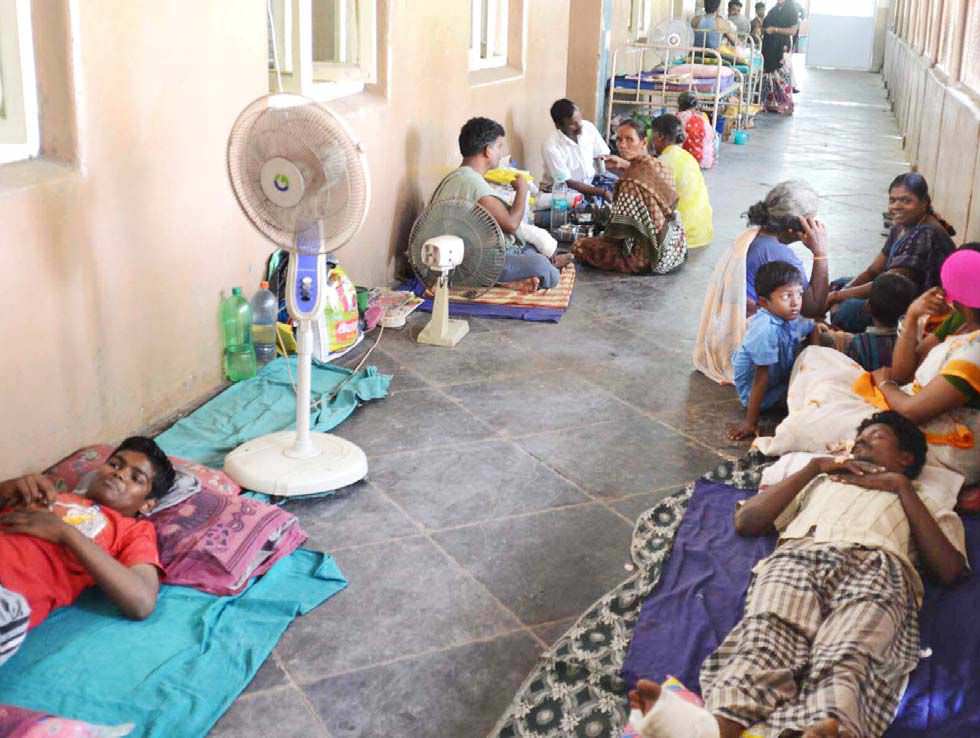Chennai has a surfeit of medical facilities, but access to health care for the poor and needy remains an issue.

THE CHENNAI METROPOLITAN AREA, SPREAD over 1,189 square kilometres in three districts and home to a seventh of the population of Tamil Nadu, has the best concentration of medical facilities anywhere in the country. From primary care to doctors’ availability to superspeciality infrastructure, Chennai has it all. But this was no accident.
Madras Medical College (MMC) was inaugurated on February 3, 1835. Eye Hospital, Egmore, attached to MMC and the second of its kind in the world, was started in 1819. MMC is also the first medical college in the world to admit a female student, Mary Ann Dacomb Scharlieb, in 1878. Soon after she passed out, she started Kasturba Gandhi Hospital (KGH, earlier Gosha Hospital) in Triplicane in 1885. The first Indian woman to graduate from MMC, Muthulakshmi Reddy, set up the Adyar Cancer Institute in 1954. Of the 32 districts in Tamil Nadu, 17 have government medical colleges—21 colleges in all (22 if the ESI College is included). Again, Chennai and its neighbourhood have the maximum number of such colleges: apart from MMC, Stanley Medical College, Kilpauk Medical College, Government Medical College (Omandurar Government Estate), Chengalpattu Medical College, and ESI-PGIMSR in K.K. Nagar. In addition, there are 19 private medical colleges. According to the Medical Council of India website, 13 of these are in Chennai or the two adjoining districts.
On paper, Chennai has a surfeit of medical facilities, but access to them for the poor and needy still remains an issue. Private medical institutions have to set apart 10 per cent of their bed strength to treat poor patients. But a top medical administrator confessed that he was unaware as to how many of the hospitals followed this in practice. The State government did not push for strict adherence to this principle, and many private institutions which have received government support in one form or the other get away with little oversight.
This story is from the April 14, 2017 edition of FRONTLINE.
Start your 7-day Magzter GOLD free trial to access thousands of curated premium stories, and 8,500+ magazines and newspapers.
Already a subscriber ? Sign In
This story is from the April 14, 2017 edition of FRONTLINE.
Start your 7-day Magzter GOLD free trial to access thousands of curated premium stories, and 8,500+ magazines and newspapers.
Already a subscriber? Sign In

How Not To Handle An Epidemic
The lockdowns were meant to buy time to put in place appropriate health measures and contain the coronavirus’ spread, but they have failed to achieve the objective and heaped immense misery on the marginalised sections of society. India is still in the exponential phase of the COVID-19 infection and community transmission is a reality that the government refuses to accept.

Tragedy on foot
As the COVID-19-induced lockdown cuts the ground beneath their feet in Tamil Nadu, thousands of migrant workers are trudging along the highway to the relative safety of their upcountry homes.

Sarpanchs as game changers
Odisha manages to keep COVID-19 well under control because of the strong participation of panchayati raj institutions and the community at the grass-roots level under the leadership of Chief Minister Naveen Patnaik.

Scapegoating China
As the COVID-19 death rate spikes and the economy tanks in the United States, Donald Trump and his advisers target China and the World Health Organisation with an eye to winning the forthcoming presidential election.

New worries
Kerala’s measured approach to the pandemic and lockdown has yielded results. But it still has to grapple with their huge economic impact on its economy, which it feels the Centre’s special financial relief package does little to alleviate.
No love lost for labour
Taking advantage of the lockdown and the inability of workers to organise protests, many State governments introduce sweeping changes to labour laws to the detriment of workers on the pretext of reviving production and boosting the economy.

Capital's Malthusian moment
In a world that needs substantial reorienting of production and distribution, Indian capital is resorting to a militant form of moribund neoliberalism to overcome its current crisis. In this pursuit of profit, it is ready and willing to throw into mortal peril millions whom it adjudicates as not worth their means—an admixture of social Darwinism born of capital’s avarice and brutalism spawned by Hindutva. .

Understanding migration
When governments and their plans are found to be blatantly wanting in addressing reverse migration, exercises such as the Ekta Parishad’s survey of migrant workers throughout India can be useful to work out creative long-lasting solutions.

Waiting for Jabalpur moment
The Supreme Court’s role in ensuring executive accountability during the ongoing lockdown leaves much to be desired. Standing in shining contrast is the record of some High Courts.

An empty package
The Modi regime, which has been unable to control the COVID-19 infection, restore economic activity and provide relief to millions exposed to starvation, trains its sights on Indian democracy, making use of the panic generated by fear and a lockdown that forecloses paths of resistance.